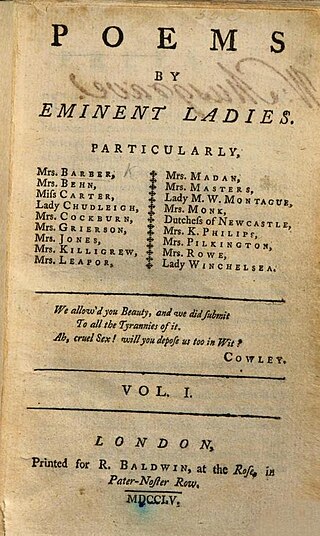Related Research Articles

Jonathan Swift was an Anglo-Irish satirist, author, essayist, political pamphleteer, poet, and Anglican cleric who became Dean of St Patrick's Cathedral, Dublin, hence his common sobriquet, "Dean Swift".

Etiquette is the set of norms of personal behaviour in polite society, usually occurring in the form of an ethical code of the expected and accepted social behaviours that accord with the conventions and norms observed and practised by a society, a social class, or a social group. In modern English usage, the French word étiquette dates from the year 1750.

Politeness is the practical application of good manners or etiquette so as not to offend others. It is a culturally defined phenomenon, and therefore what is considered polite in one culture can sometimes be quite rude or simply eccentric in another cultural context.

The Land of Nod is a place mentioned in the Book of Genesis of the Hebrew Bible, located "on the east of Eden" (qiḏmaṯ-ʿḖḏen), where Cain was exiled by God after Cain had murdered his brother Abel. According to Genesis 4:16:
And Cain went out from the presence of the LORD, and dwelt in the land of Nod, on the east of Eden.
וַיֵּ֥צֵא קַ֖יִן מִלִּפְנֵ֣י יְהוָ֑ה וַיֵּ֥שֶׁב בְּאֶֽרֶץ־נֹ֖וד קִדְמַת־עֵֽדֶן׃
This article contains information about the literary events and publications of 1738.

Conversation is interactive communication between two or more people. The development of conversational skills and etiquette is an important part of socialization. The development of conversational skills in a new language is a frequent focus of language teaching and learning. Conversation analysis is a branch of sociology which studies the structure and organization of human interaction, with a more specific focus on conversational interaction.
The Japanese language has a system of honorific speech, referred to as keigo, parts of speech that show respect. Their use is mandatory in many social situations. Honorifics in Japanese may be used to emphasize social distance or disparity in rank, or to emphasize social intimacy or similarity in rank. Japanese honorific titles, often simply called honorifics, consist of suffixes and prefixes when referring to others in a conversation.

George Lyttelton, 1st Baron Lyttelton,, known between 1751 and 1756 as Sir George Lyttelton, 5th Baronet, was a British statesman. As an author himself, he was also a supporter of other writers and as a patron of the arts made an important contribution to the development of 18th-century landscape design.

The Book of Rites, also known as the Liji, is a collection of texts describing the social forms, administration, and ceremonial rites of the Zhou dynasty as they were understood in the Warring States and the early Han periods. The Book of Rites, along with the Rites of Zhou (Zhōulǐ) and the Book of Etiquette and Rites (Yílǐ), which are together known as the "Three Li (Sānlǐ)," constitute the ritual (lǐ) section of the Five Classics which lay at the core of the traditional Confucian canon. As a core text of the Confucian canon, it is also known as the Classic of Rites or Lijing, which some scholars believe was the original title before it was changed by Dai Sheng.

By the Pricking of My Thumbs is a work of detective fiction by Agatha Christie and first published in the UK by the Collins Crime Club in November 1968 and in the US by Dodd, Mead and Company later in the same year. The UK edition retailed at twenty-one shillings (21/-) and the US edition at $4.95. It features her detectives Tommy and Tuppence Beresford.
Katharine Weber is an American novelist and nonfiction writer. She has taught fiction and nonfiction writing at Yale University, Goucher College, the Paris Writers Workshop and elsewhere. She held the Visiting Richard L. Thomas Chair in Creative Writing at Kenyon College from 2012 to 2019.

Mei-mei Berssenbrugge is a contemporary poet. Winner of two American Book Awards, her work is often associated with the Language School, the poetry of the New York School, phenomenology, and visual art. She is married to the painter Richard Tuttle, with whom she has frequently collaborated.

Rudeness is a display of actual or perceived disrespect by not complying with the social norms or etiquette of a group or culture. These norms have been established as the essential boundaries of normally accepted behavior. To be unable or unwilling to align one's behavior with these norms known to the general population of what is socially acceptable is to be rude and are enforced as though they were a sort of social law, with social repercussions or rewards for violators or advocates, respectively.

The Old Man in the Corner is an unnamed armchair detective who appears in a series of short stories written by Baroness Orczy. He examines and solves crimes while sitting in the corner of a genteel London tea-room in conversation with a female journalist. He was one of the first of this character-type created in the wake of the huge popularity of the Sherlock Holmes stories. The character's moniker is used as the title of the collection of the earliest stories featuring the character.

Mary Barber, Irish poet, was a member of Swift's circle. She has been described as "a domestic, small-scale, early eighteenth-century poet of charm and intelligence, but also an incisive, often satirical commentator on social and gender issues."

'Arthur Devis was an English artist whose father, Anthony, was progenitor of what became a family dynasty of painters and writers. The place of Arthur Devis in art history is generally as painter of the type of portrait now called a conversation piece. After moving to London and apprenticeship to a Flemish topographical artist there, he switched to portraiture and acquired a considerable reputation, although this success did not last. Unable to adapt to later fashionable artistic currents, his commissions declined and his work was largely forgotten after his death until the 20th century revival of interest in the conversation piece.

An Essay on the Art of Ingeniously Tormenting was a conduct book written by Jane Collier and published in 1753. The Essay was Collier's first work, and operates as a satirical advice book on how to nag. It was modelled after Jonathan Swift's satirical essays, and is intended to "teach" a reader the various methods for "teasing and mortifying" one's acquaintances. It is divided into two sections that are organised for "advice" to specific groups, and it is followed by "General Rules" for all people to follow.

Tea has long been used as an umbrella term for several different meals. English writer Isabella Beeton, whose books on home economics were widely read in the 19th century, describes meals of various kinds and provides menus for the "old-fashioned tea", the "at-home tea", the "family tea", and the "high tea".

On Social Freedom: or the Necessary Limits of Individual Freedom Arising Out of the Conditions of Our Social Life is an essay regarding individual and societal freedom initially thought to have been written by the British philosopher John Stuart Mill, but later found to have been falsely attributed to him.
There are seven verb paradigms or speech levels in Korean, and each level has its own unique set of verb endings which are used to indicate the level of formality of a situation. Unlike honorifics – which are used to show respect towards someone mentioned in a sentence – speech levels are used to show respect towards a speaker's or writer's audience, or reflect the formality or informality of the situation. They represent a system of honorifics in the linguistic use of the term as a grammar system, distinct from honorific titles.
References
- ↑ §17. "Genteel Conversation, Directions to Servants, Argument against abolishing Christianity," and other Pamphlets. IV. Swift. Vol. 9. From Steele and Addison to Pope and Swift. The Cambridge History of English and American Literature: An Encyclopedia...
- ↑ The Wines Of France. – André L Simon [ dead link ]
- ↑ A Modest Proposal and Other Satires, Introduction, pp. 23–24, George R. Levine, Prometheus Books, 1995, ISBN 0-87975-919-4.
